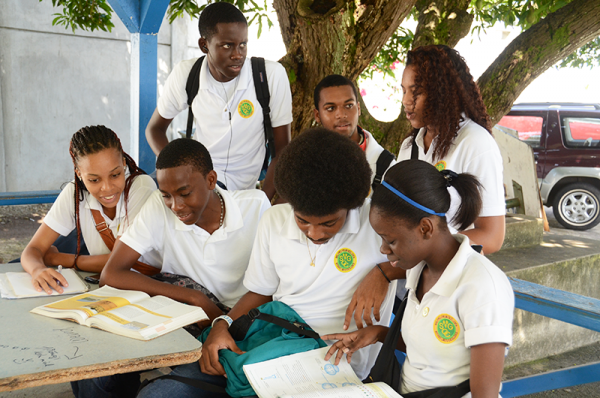What is it?
The National Student Loan Programme was introduced in 1994. It is intended to provide loans to students who wish to pursue studies and who upon completion of their studies are expected to contribute to the Economic and Social Development of St. Vincent and the Grenadines.
How is it administered?
The funds for the programme are provided by the National Insurance Services to financial institutions who in turn provide loans to students.
The commercial banks, GECCU, KCCU, and the Teachers Credit Unions are the executing agencies for the programme. The Ministry of Education serves as the Secretariat for the programme and receives applications on prescribed forms from potential beneficiaries. These forms are then forwarded to the National Student Loan Advisory Committee which examines the eligibility of the student, programme, the institution, and the estimated expenses, before recommending the applications to the Financial Institutions. The Advisory Committee is comprised of representatives from the National Insurance Services, the Bank of St. Vincent and the Grenadines, Ministry of Finance, Ministry of Education and the Chamber of Industry and Commerce. It is important to note that the recommendation of the Advisory Committee does not imply that the loan would be granted.
The Financial Institutions assess the creditworthiness of the applicants and determine which of the recommended applicants are eligible to receive loans.
Loan Amount
The maximum limit on a loan is EC$ 120,000 and an interest of 8.5% per annum is charged. Students may choose to have their interest capitalised during the period of study. Borrowers will be required to repay the loan by monthly installments over a period of not more than 12 years commencing not later than 3 months after the date of the student’s employment after completion of the programme of study or 6 months after completion of the programme of study (whichever first occurs).
Loans will be granted for courses of up to 5 years duration. The students or their guarantors are required to provide acceptable collateral to the lender who reserves the right to decline at its discretion.
Eligible Expenses
The proceeds of the loan may be used to finance the basic academic costs of enrolment, tuition, books, transportation, personal maintenance costs (including room and board), child care, legal expenses with respect to the security of the loan, insurance coverage (life) and if the borrower so requests interest on the loan during the grace period for repayment of the loan.
Eligibility of the Applicants
- Be a national of St. Vincent and the Grenadines;
- Have resided in the Country for at least five (5) years immediately preceding the date of the application for the loan. Exceptions would be made for the persons who were abroad during this period for the sole purpose of pursuing studies;
- Students are advised to complete their A’Levels Programme and first-year University Degree locally to reduce the cost and duration of overseas studies.
Obligations of the Applicants
- The student must attend the educational institution and pursue the programme of study for which the loan is made. Any transfer contemplated in respect of the educational institution or programme of study must be approved by the Advisory Committee.
- A student after termination of the programme of study must work in one of the member countries of the CDB for at least 1 year.
Eligible Programme of Study
- A list of higher and technical/vocational programmes of study based on the manpower training needs of St. Vincent and the Grenadines will be published annually by the Service Commissions Department.
Eligible Institutions
- In pursuing a course of study, the student should preferably attend a regional educational institution.
- Students may, with the approval of the Committee, attend an extra-regional educational institution in cases where the programme of study for which the loan is to be made is not available at a regional institution but the following criteria apply:
- The costs of pursuing the programme of study at an extra-regional educational institution are substantially less than the costs/or comparable to that of pursuing the programme of study at a regional educational institution.
- No loans shall be made for a programme of study at a non-accredited educational institution, as shall be determined by the Advisory Committee.
- Loans may be made for financing study tours and attachments at or organised by approved educational, development or commercial organizations.
Special Loan Programme for the Economically Disadvantaged
In 2002, the Government of St. Vincent and the Grenadines made a policy decision to allocate a proportion of the funds for the Student Loan Programme to assist the most indigent segment of the population.
The principal beneficiaries under this programme are those persons who have the ability, but lack the financial and other resources to qualify for assistance under the Standard Student Loan Scheme.
Students accessing loans under this Programme will be required to sign a bond for the amount of the loan. In this regard, persons whose loans are approved under this programme will have their loans secured by the Government of St. Vincent and the Grenadines.

Who is eligible?
In addition to the Student Loan Scheme Guidelines, an applicant would be eligible to benefit under this programme if he/she is from a household that exhibits most of the following characteristics:
- Be of good academic standing (results of examinations approved by the MOE)
- A member of a household with an annual income below $10,000
- Lack of assets (especially land and monetary saving) and can demonstrate that they do not qualify for credit.
- Lack of productive, remunerative work and a heavy concentration on low productivity, informal type occupation.
- Households with few earners and a high dependency ratio
- A member of a large household (2 adults and 4 children below the age of 18)
- A member of a single-parent headed household
- Member of female-headed household
- Households where the principal income earner has become displaced (e.g. children of disabled or indigent parents).
- Member of vulnerable groups (e.g. children of disabled or indigent parents).
How do you apply?
All applicants must complete the standard application form. Those persons who wish to benefit under the Special Programme for the Economically Disadvantaged must, in addition to completing the standard application form, complete appendix 1 of the form. All sections of the form must be completed.
Application forms, which are available at the Service Commissions Department and the Ministry of Education and the NIS, must be completed and submitted to the Permanent Secretary, Ministry of Education by June 30th of each year.
Recommended applicants are expected to complete the negotiations for loans with the Financial Institutions by March 31st of the academic year.
Applicants who are unsuccessful in obtaining loans during the academic year in which their applications were processed, will not be automatically considered for the following year. Unsuccessful applicants are required to either re-apply or to request in writing to the Permanent Secretary that their application be considered for the next academic year.
